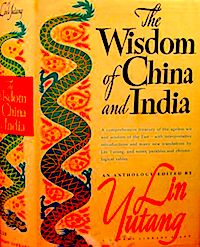

Tao Te Ching

Wisdom of China and India
By Lín Yǔtáng
Insightful, comprehensive, and illuminating compilation, summary, and commentary on our ancient inheritance of wisdom from the East. Lin Yutang was one of the first to seriously bridge the gap between east and west and this book represents one of his most effective and successful examples. With clear and understandable English he brings to life the piety, imagination, and humor expressed through the sacred texts and culture of India. He translates and explains the Chinese texts and traditions including Buddhism, Taoism, and Confucianism and their influence on Chinese mysticism, democracy, politics, and poetry.
Themes
Quotes from Wisdom of China and India
“Does the West have a philosophy? The answer is clearly, 'No'. We need a philosophy of living and we clearly haven't got it... There are professors of philosophy, but there are no philosophers... philosophy itself has become a branch of physics or biology or mathematics.”
Chapters:
Comments: Click to comment
“I would characterize the Confucian political ideal as strictly anarchism, in which moral culture of the people making government unnecessary become the ideal. If it is asked why the people of Chinatown in New York never have any use for the the police, the answer is Confucianism. There never were any police in China for 4000 years.”
Chapters:
Comments: Click to comment
“If there is one book in the whole of Oriental literature which one should read above all others, it is, in my opinion, Lao Tzu's Tao Te Ching. If there is one book that can claim to interpret for us the spirit of the Orient, or that is necessary to understanding of characteristic Chinese behavior, including literally 'the ways that are dark,' it is the Tao Te Ching.”
Chapters:
Comments: Click to comment
“Not until we see the richness of the Hindu mind and its essential spirituality can we understand India or hope to share the freedom and equality... we are trying to create out of this morally and politically chaotic world... India was China's teacher in religion and imaginative literature, and the world's teacher in trigonometry, quadratic equations, grammar, phonetics, Arabian Nights, animal fables, chess, as well as in philosophy that inspired Goethe, Schopenhauer, Emerson, and probably also old Aesop.”
Chapters:
Comments: Click to comment
“One of the most biting satirists of Chinese culture... Lusin is God to the leftist writers of China today... [he] represents the Literature of Revolt. But this is in itself a sign of life... China needed a man like Lusin to wake the millions up from the self-complacency and lethargy and the accumulated inertia of 4000 years.”
Chapters:
Comments: Click to comment
“Only a robust mind like that of Walt Whitman who was not inflicted with the scientific spirit and who was in close touch with life itself and with the great humanity could retain that enormous love and enormous faith in the common man.”
Chapters:
Comments: Click to comment
“People need to learn how to regulate their lives socially and not just rely upon the law. The law should be the resort of the scoundrel... for 4000 years, China had no police.”
Chapters:
Comments: Click to comment
“that politics must be subordinated to morals, that government is a makeshift of temporization, law a superficial instrument of order, and police force a foolish invention for morally immature individuals”
Chapters:
Comments: Click to comment
“when we speak of democracy as a way of life and talk of the spirit of democracy, we can talk about 'Chinese democracy'—the idea of government for the people and by the consent of the people, but not government by the people and of the people. While parliamentary government is based on distrust of the ruler, Confucian ideals emphasized moral harmony as the basis of political harmony, laissez faire as the key policy and only one that has ever worked; the Great Chinese empire was always ruled without police depending—not on government or soldiers—but on the self-government of the people.”
Chapters:
Comments: Click to comment
Comments (0)